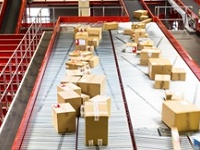German CEP volumes grow over 6% in 2017, exceeding 3.3 billion items

The German courier express and parcel (CEP) market grew at solid single-digit rates last year, driven again by a dynamic increase of nearly 10% in B2C deliveries, and similar growth is predicted for 2018 and beyond, according to a new study.
The total market grew by 4.9% to turnover of €19.4 billion in 2017 while volumes increased by 6.1% to 3.35 billion shipments (190 million shipments more than in 2016) which is nearly twice as much as in 2000 (+98%), according to the annual market study of the German Parcels & Express Logistics association (BIEK) which was presented in Berlin yesterday.
This was slightly lower growth than in 2016, the study by KE-CONSULT Kurte&Esser GbR for BIEK showed.
The key growth driver remained the B2C segment where volumes increased by 9.7% last year. This was a drop on 2016 when volumes increased by a strong 13.2%. The B2C shipments continue to account for an increasing share of the total shipment volumes. However, B2B volumes also increased in 2017 with a 1.3% rise in domestic shipments which more than doubles the growth of the previous year.
The parcels market accounts for the largest share of the CEP market in Germany generating 55% of the revenues in 2017, which corresponds to a 5.3% increase. The express market accounts for 23% of the revenues and courier shipments, 22%. Shipment volumes in the parcels market rose by 6.4% year-on-year in 2017. This is slightly above the growth of the market as a whole (+6.1 %). The growth driver was once again international shipments with an 8.8% increase.
“CEP operators respond to the growing demand in a faster and more individualised way. To this end, they develop digital innovations, automate processes thus increasing their efficiency. Existing business processes are optimised and completely new business models are created. This offers great opportunities from which both end customers and retailers benefit,” BIEK explained.
“The efficiency increases already in the depot: shipments are automatically scanned and allocated, sorting systems handle more parcels. The software optimises the route planning so that shipments can be cancelled or redirected at short notice. Recipients can control shipments themselves, delays are avoided. All this helps to increase the capacity utilisation of the vehicles, to avoid unnecessary traffic and to deliver at the first attempt. Retailers also benefit: returns are processed faster, they are quickly returned for sale and inventories are reduced.”
BIEK chairman Florian Gerster commented: “CEP companies make more of the industry growth. They recognised early on that consistent digitisation and automation offer huge efficiency opportunities and are driving innovations at a rapid pace. Today, CEP companies in Germany transport 11 million items in one delivery day and are in contact with around 6 million customers. This is an enormous service performance that is constantly improving thanks to direct communication with customers. The CEP sector is thus also setting the necessary digital course for the future - by 2022 more than 4.3 billion consignments are expected to be transported in Germany every year".
The CEP sector employed around 229,600 people in Germany in 2017 which is 10,000 more than in 2016.
For 2018, BIEK forecasts overall market growth of about 5.5% in volumes. Further strong growth in domestic and cross-border e-commerce are again likely to be the main growth drivers.
For the domestic parcels market in Germany, BIEK predicts growth of 5.5-6% for 2018. B2C shipments are expected to increase by 8-9% and B2B shipments by 1-2%. This would further increase the share of the B2C shipments in the parcels market to 62%.
The CEP market study has been published annually since 2004. It covers the entire German CEP market, including the BIEK members DPD, GLS, GO!, Hermes and UPS, with current market developments and trends.
